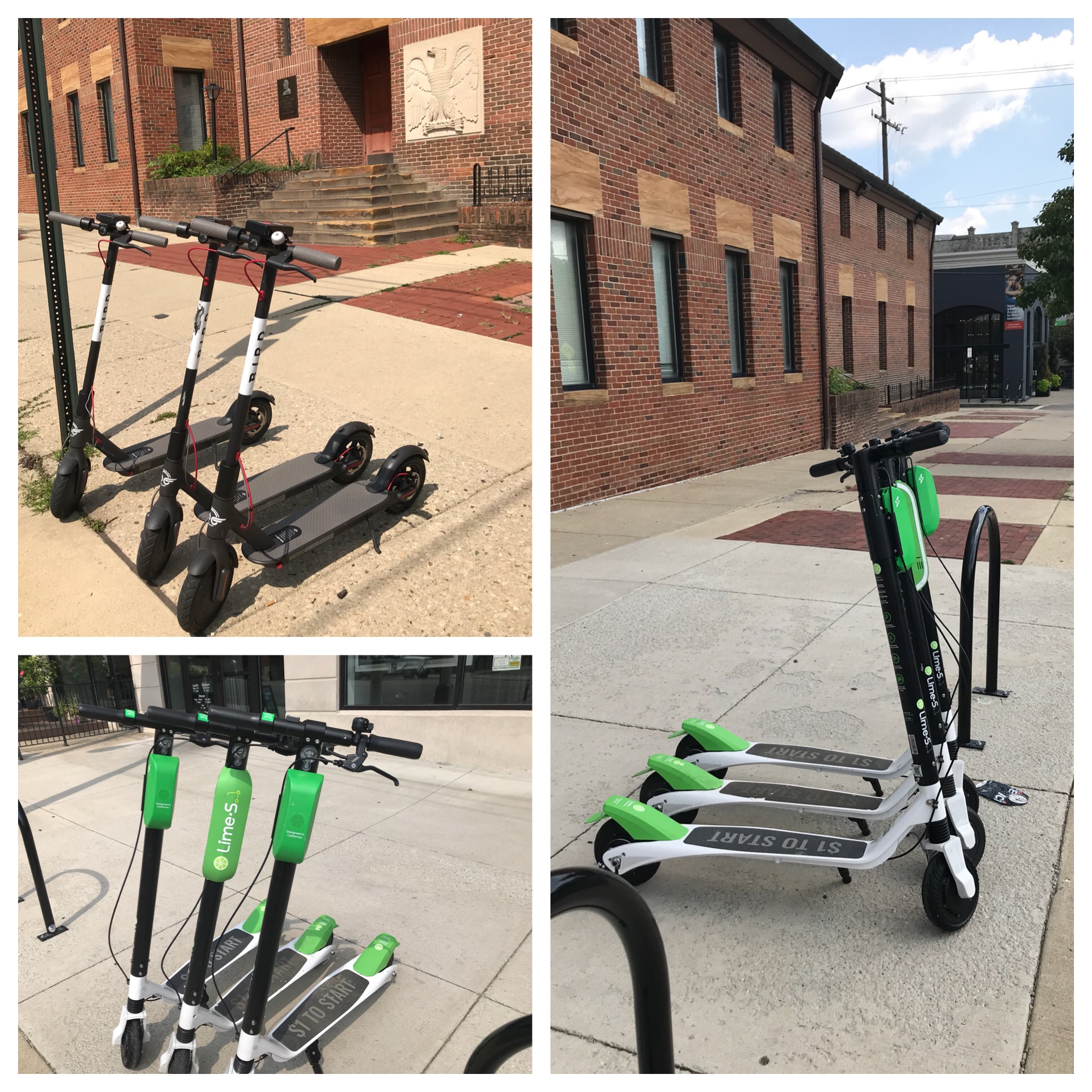
By: Holly B. Cline
Lime (“LimeBike” and “Lime-S”) and Bird are two companies offering dockless electric scooter (and bike) share service in Columbus. The “dockless” quality of these scooters and bikes—meaning they can be parked on the edge of a sidewalk or on a local bike rack and get unlocked with a smartphone app—have appealed to users throughout the county over the last year.
LimeBike first launched its Ohio bike sharing program in Dublin, Ohio on May 5, 2018. Since then, it has expanded its bike sharing program throughout central Ohio, and its offering to include a Lime-S electric scooter share service as well.
On June 4, 2018, Lime began a six-month pilot program in Columbus for its bicycles on, scattering them around Downtown and in Clintonville, Linden, and the South Side. On July 29, 2018, Lime expanded its pilot program by bringing its scooters to Columbus, placing them in the same locations as its bicycles. Riders are able to use a mobile phone app to access and unlock both the scooters and bikes. Lime scooters cost $1.00 to unlock and 15 cents per minute after that; the bicycles cost $1 for a 30-minute ride.
Bird introduced its scooters to multiple Columbus neighborhoods—including Downtown—on July 11, 2018.
Scooting Responsibly: Legal Issues Associated With Electric Scooters
Notably, there are presently no regulations in the City of Columbus for the motorized electric scooters offered by Lime-S and Bird. City Councilman Emmanuel Remy said the city is looking closely at the new technology.
Motorized scooters also known as electric personal assistive mobility devices are here in Columbus. We look forward to assessing the impact of this mode of transportation on the City, and how it aligns with our values for safety, mobility, and inclusiveness.
One of the initial issues posed by the electric scooters is where to operate them. Generally speaking, bicycles—except when operated by children—must be ridden on streets with other motor vehicles in, where available, the designated bike lane. Bicyclists are required to follow the same traffic laws that are applicable to motor vehicles.
However, on August 13, 2018, Columbus City Attorney Zach Klein’s Office clarified to local police that motorized scooters can be ridden on streets or sidewalks—as long as the drivers do so responsibly.
“Because of the lack of clarity in the law surrounding how these types of scooters should be regulated in sidewalk and roadway usage, we have instructed the [Columbus] Division of Police that they are allowed to be ridden on both,” according to a statement by the City Attorney's Office. “We look forward to offering guidance to Council and the Administration as they continue to determine how these scooters should be regulated.”
In other words, until Columbus City Council decides to regulate their usage, the electric scooters can be operated on either the sidewalk or the roadway.
Sergeant Brooke Wilson of the Columbus Police Department recently reported that there have been no serious or fatal crashes in Columbus involving the scooters, adding, however, that the police department doesn’t have any reliable crash statistics because the technology has been out for weeks and it takes a couple of months to get crash reports.
The City Attorney’s Office also explained that the motorized scooters should not be ridden recklessly, while impaired, or in violation of other laws. However, whether it is unlawful to operate an electric scooter while impaired appears to remain—at this time—an unanswered question.
R.C. 4511.19 prohibits a person from operating a vehicle, streetcar, or trackless trolley while under the influence of drugs or alcohol. While it is unclear whether a motorized or electronic scooter would be considered a “vehicle” under Ohio law, Ohio courts have long held that an individual can be charged with OVI while operating a bicycle. Moreover, a citation for OVI on a bicycle carries the exact same potential penalties as an OVI citation in a car.
Ohio law defines “vehicles” as “everything on wheels or runners, including motorized bicycles, but does not mean electric personal assistive mobility devices, vehicles that are operated exclusively on rails or tracks or from overhead electric trolley wires, and vehicles that belong to any police department, municipal fire department, or volunteer fire department, or that are used by such a department in the discharge of its functions.” (R.C. 4511.01(A)). A “motorized bicycle" or “moped” means any vehicle having either two tandem wheels or one wheel in the front and two wheels in the rear, that may be pedaled, and that is equipped with a helper motor of not more than fifty cubic centimeters piston displacement that produces not more than one brake horsepower and is capable of propelling the vehicle at a speed of not greater than twenty miles per hour on a level surface. R.C. 4511.01(H)(2).
The relevant statutory provisions do not define “electric personal assistive mobility devices.” R.C. 4511.512 regulates the operation of electric personal assistive mobility devices, and also permits a local authority to regulate or prohibit the operation of electric personal assistive mobility devices on public streets, highways, sidewalks, and paths, and portions of roadways set aside for the exclusive use of bicycles, under its jurisdiction.
If the Lime-S and Bird electric scooters are considered to be “electric personal assistive mobility devices” and not “vehicles” under R.C. 4511.01(A), then R.C. 4511.512(B) prohibits an operator of any such electric personal assistive mobility device from doing any of the following:
(1) Failing to yield the right-of-way to all pedestrians and human-powered vehicles at all times;
(2) Failing to give an audible signal before overtaking and passing a pedestrian;
(3) Operating the device at night unless the device or its operator is equipped with or wearing both of the following: (a) A lamp pointing to the front that emits a white light visible from a distance of not less than five hundred feet; and (b) A red reflector facing the rear that is visible from all distances from one hundred feet to six hundred feet when directly in front of lawful lower beams of head lamps on a motor vehicle.
(4) Operating the device on any portion of a street or highway that has an established speed limit of fifty-five miles per hour or more;
(5) Operating the device upon any path set aside for the exclusive use of pedestrians or other specialized use when an appropriate sign giving notice of the specialized use is posted on the path;
(6) If under eighteen years of age, operating the device unless wearing a protective helmet on the person's head with the chin strap properly fastened;
(7) If under sixteen years of age, operating the device unless, during the operation, the person is under the direct visual and audible supervision of another person who is eighteen years of age or older and is responsible for the immediate care of the person under sixteen years of age.
A violation of any one of these provisions is a minor misdemeanor.
Thus, it remains unclear whether an electric scooter should be considered a “vehicle” like a bicycle—on which an operator can be charged for OVI—or an “electric personal assistive mobility device—on which an operator cannot be charged for an OVI. Notably, several police departments in cities operating Lime-S or Bird electric scooter programs before Columbus have concluded that a person can be charged with OVI (DUI/DWI) on an electric scooter.
Safety Concerns With Motorized Scooters
Citing safety concerns, both Bexley and Upper Arlington have prohibited the motorized scooters from being operated on both the streets and the sidewalks.
A spokesperson for Bird said the company has safety requirements in place to avoid issues.
We take several steps to communicate to our riders how to safely and lawfully ride a Bird. This includes: requiring riders to upload a driver’s license and confirming they are 18 or older, providing safety instructions in the app and on each Bird about not riding on sidewalks, and offering free helmets to all riders who request one. Bird urges all riders to wear a helmet, and that's why we have distributed nearly 40,000 free helmets.
Bike and Motorized Scooter Sharing Programs in Columbus and at The Ohio State University
In a partnership with the City of Columbus, Motivate has been operating Columbus’s Bike Sharing Program—CoGo Bike Share—since July 2013. CoGo Bike Share presently has 46 stations and 365 bikes throughout the City of Columbus. The automated system features annual memberships ($75.00, or $7.00 per month with annual commitment); 24-hour day passes ($8.00); and 3-day passes ($18.00), which can be purchased at a station or online.
Just two years later, in 2015, Ohio State entered into a three-year-contract with Zagster to organize and operate a campus bike-share system. However, with Zagster’s contract ending this month, university officials are considering hiring Lime to operate its campus bike and motorized scooter sharing system.
“This new pilot program more closely aligns with nearby communities and continues to support the city of Columbus’ Smart Cities effort,” said Ohio State spokesman Dan Hedman. “Ohio State continues to support alternative mobility options to best serve the needs of our campus community. Our focus remains providing a menu of options that deliver convenient, affordable service and connectivity to the surrounding community.”
On August 13, 2018, Lime introduced 125 dockless bicycles and an unknown number of scooters to Ohio State University’s campus, expanding the reach of its service in Columbus. Bird spokesman Abraham White said he was looking into whether Bird will follow suit on campus.
###
This post was originally published on LinkedIn.
Disclaimer: The information in this blog post (“post”) is provided for general informational purposes only, and may not reflect the current law in your jurisdiction. No information contained in this post should be construed as legal advice from the Tyack Law Firm Co., L.P.A., or the individual author, nor is it intended to be a substitute for legal counsel or representation on any subject matter. No reader of this post should act or refrain from acting on the basis of any information included in, or accessible through, this post without seeking the appropriate legal or other professional advice on the particular facts and circumstances at issue from a lawyer licensed in the recipient’s state, country, county, or other appropriate licensing jurisdiction.
Talk with an experienced lawyer today.
Fill out the form below to get started with your case evaluation.















